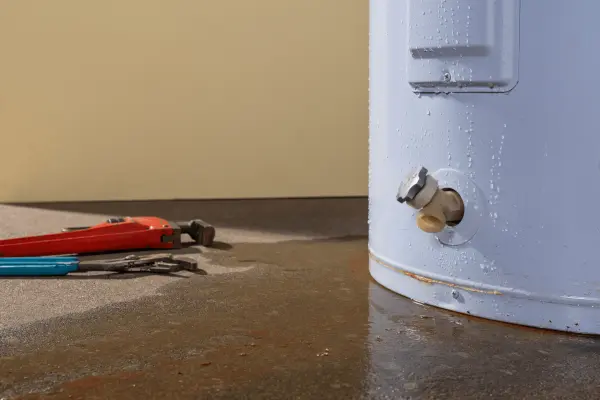Is your water heater making weird sounds? You’re not the only one hearing them. Sometimes, water heaters can make strange noises that might worry you. But don’t be scared! This guide will explain these sounds and help you understand what’s happening in your water heater. From rumbling and hissing to ticking and popping, we’ll tell you why they happen and how to fix them. So, let’s start and figure out how to have nice hot showers without the spooky sounds.
1. Banging/Rumbling
The Noise:
If your water heater sometimes sounds like a little explosion is happening inside, it’s probably making banging or rumbling noises.
The Cause:
This noise stems from excess sediment build-up in the tank, which traps water beneath it. When the water gets hot, it boils, creating pressure, which causes these strange noises.
The Solution:
You can drain the tank to remove the dirt inside to fix this. Watch out for something called “water hammer,” which happens when water suddenly stops or changes direction and makes the pipes bang. You might need a water hammer arrestor or a valve that eases the pressure to prevent the water hammer. If the problem continues, getting help from a professional technician is a good idea.
2. Crackling/Hissing
The Noise:
If you notice crackling or hissing sounds, especially with electric water heaters, don’t panic.
The Cause:
Occasional crackling is typical as the heating element heats up, but continuous noises may indicate sediment buildup. In gas or oil heaters, hissing can be due to moisture build-up.
The Solution:
To address sediment, drain the tank. Check for moisture in gas/oil heaters and dry the area if necessary. If the problem persists, consult a professional for a thorough inspection and potential repair.
3. Ticking
The Noise:
The ticking noise from your water heater can be alarming, but it’s often not as severe as it sounds.
The Cause:
Ticking typically results from sudden changes in water pressure within the tank.
The Solution:
To fix this, you can change the pressure-reducing valve and add straps or insulation to quiet down the noise. If the ticking sound doesn’t go away, it’s a good idea to call a technician for more help.
4. Screeching/Whistling
The Noise:
High-pitched screeching or whistling sounds can be bothersome.
The Cause:
Loose valves, like those on the temperature, inlet/outlet, or pressure relief valves, are often the reason for these noises.
The Solution:
Inspect and tighten the valves causing the noise. If the noise doesn’t stop, getting help from a technician is a good idea. Valve problems can mess up the temperature and pressure in your water heater, which might harm it, so it’s best to let a professional look.
5. Popping
The Noise:
Popping sounds are often associated with excess sediment and rust.
The Cause:
The alkali in water reacts with the heating element, causing rust. The popping occurs as the bubbles of trapped gas escape through the sediment.
The Solution:
To address this, flush the tank to remove sediment and consider replacing the anode rod. A water purification system may also help prevent this issue if you live in an area with hard water.
What to Do When Your Water Heater Is Making Noises
While experienced DIYers can address some of these water heaters sounds through DIY solutions, it’s essential to emphasize the importance of professional assistance. Water heaters are complex systems and incorrect repairs can lead to hazardous situations.
Here’s what you should remember:
Rumbling:
Address sediment build-up through draining, but consider professional help if inexperienced.
Popping:
Flush the tank and replace the anode rod. Consult a professional if necessary.
Sizzling, Hissing, or Crackling:
Regularly flush and drain your tank, and be aware of the gas-powered water heaters’ differences.
Ticking:
Adjust the pressure-reducing valve and check the pipe straps.
Screeching, Screaming, or Singing:
Investigate relief valves and water lines, and call a plumber if needed.
Banging or Hammering:
Be cautious of water hammers, and consider preventive measures like water hammer arrestors or pressure-reducing valves.
Conclusion:
In conclusion, if your water heater is making strange noises, it’s essential to understand the reasons behind these sounds and how to address them. From rumbling to hissing, ticking, screeching, and popping, each noise can have specific causes and solutions. So, stay alert, address these sounds promptly, and enjoy pleasant hot showers without strange noises bothering you. Water heaters are complex systems, and incorrect repairs can lead to safety risks. Remember, maintaining your water heater ensures a cozy and trouble-free home. So, pay attention, fix these sounds quickly, and have nice hot showers without being bothered by strange noises.






